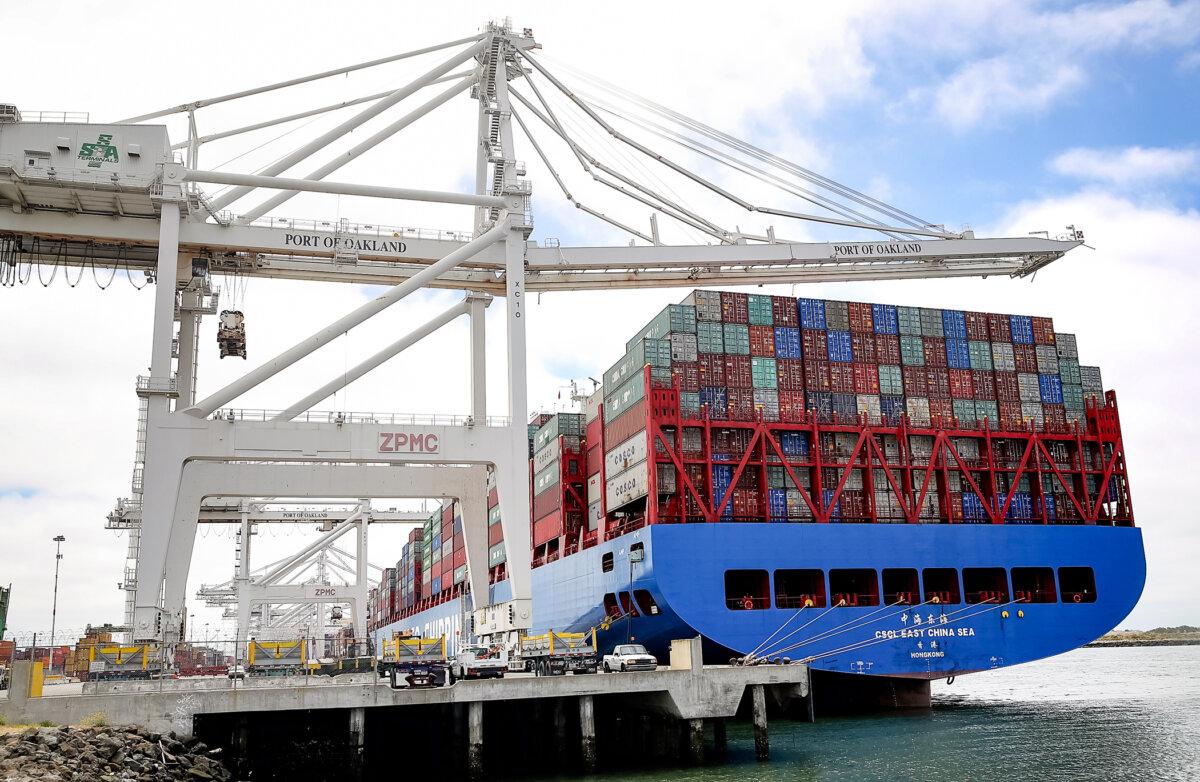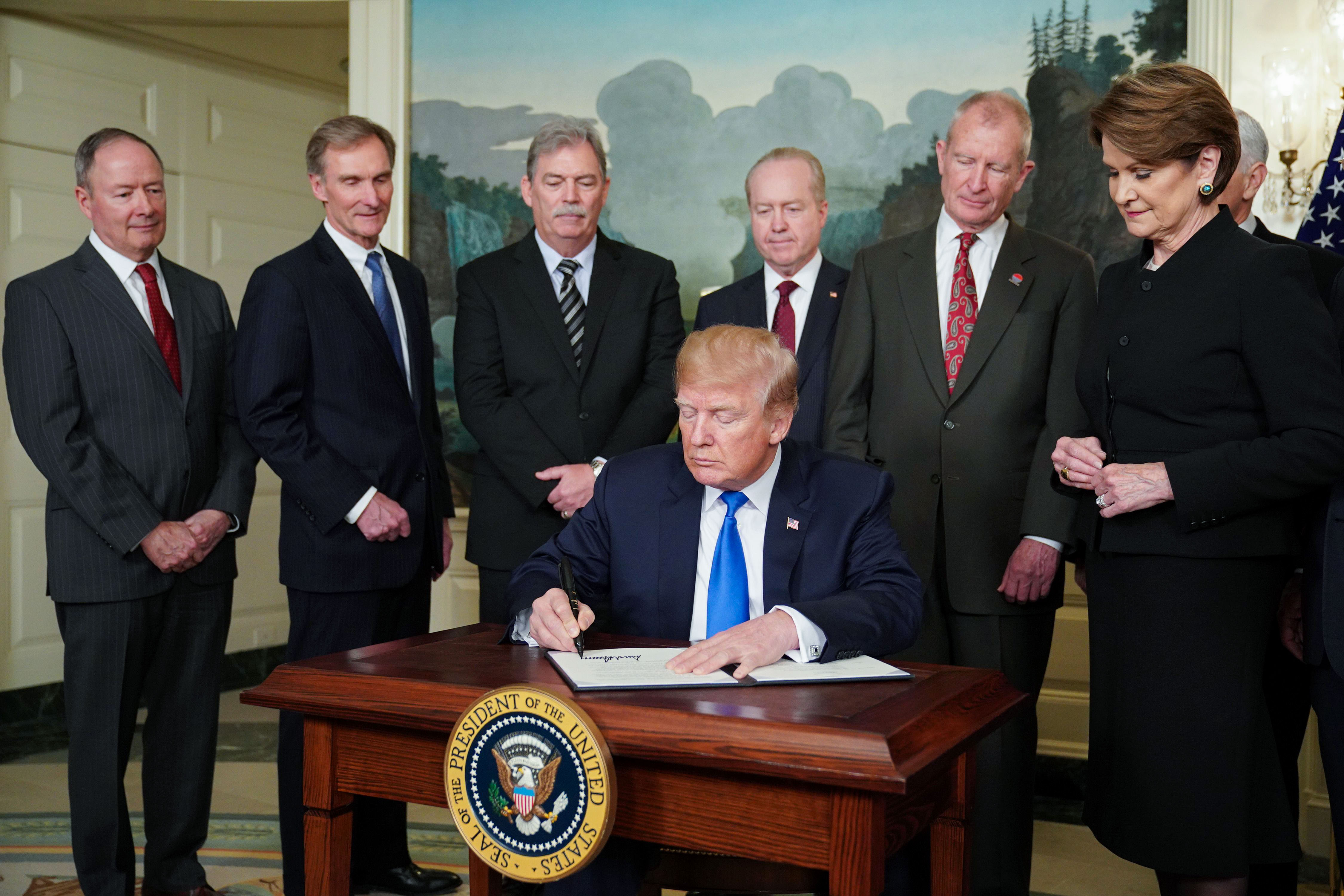Economists near-universally warn that President-elect Donald Trump’s pledge to impose “across-the-board” 10-to-20-percent tariffs on imports will trigger inflation, disrupt domestic industries, and spur global trade wars.
Despite overwhelming critical consensus, Trump calls tariffs “the most beautiful word in the dictionary” and hasn’t backed down since his Nov. 5 reelection.
But the threats may be a “negotiating tactic” to give the United States leverage in mediating trade pacts, Peterson Institute for International Economics (PIIE) President Adam Posen said during a Nov. 14 virtual event.
And it may be working already.
Japan, South Korea, the United Kingdom, Canada, “and maybe some others, are likely lining up offers,” he said.
“These offers will be in the form of, ‘We promise to buy more natural gas from the U.S. ... We promise to move more production to the U.S.,’” Posen said.
European Commission President Ursula von der Leyen suggested on Nov. 8 that European Union (EU) nations can buy more liquified natural gas (LNG) from the United States to avoid tariffs.
Speaking to reporters after congratulating the president-elect on his reelection, von der Leyen said Trump appeared eager to sustain what the Congressional Research Service calls “the world’s largest trade and investment relationship,” which accounts for 46 percent of global gross domestic product.
About 48 percent of LNG used by EU nations is imported from the United States, according to the U.S. Energy Information Administration. Noting that EU nations import up to 16 percent of LNG from Russia, von der Leyen said there’s room for a deal.
“Why not replace it by American LNG, which is cheaper for us and brings down our energy prices?” she said.
Posen said this is exactly what Trump’s team wants to achieve.
“The ideal outcome for the Trump administration is they’ve made this threat, a set of threats, but they don’t actually have to implement them, and they get these goodies,” he said.
In the short term, Posen said, some nations may acquiesce.
“They’ll say: ‘OK, we don’t want to be on the bad side of the U.S. We don’t want a bad side of a President Trump,’“ he said. ”But in [the] medium-term, two to four or five years out, I think the reverberations could be quite large.”
Responses from “like-minded U.S. allies” will differ from those from China, Mexico, and nonaligned nations, such as India and Indonesia, he said.
“[Allies are] probably just going to try to make nice with Trump: ‘We’re going to be aligned with the U.S. on national security and, therefore, against China,’” Posen said. “We should just … try to be on the inside of a ‘Fortress America economy’ and grow with them.”
There are at least two problems with this scenario, he said.
“Getting these goodies is really not necessarily going to solve a bunch of problems,“ he said. ”A number of people close to the president-elect believe trade deficits are really a big deal.
“These measures are likely to actually increase U.S. trade deficits because they'll drive up the dollar, drive up inflation.”
Posen said the second problem is that “this is not a one-round game,“ adding that ”once this happens ... the question is, how do economies adapt and how do they cope?”
“Maybe in that sense ... people start building the U.S. out. That’s something we’re going to watch,” he said.

The CSCL East China Sea container ship sits in a berth at the Port of Oakland in Oakland, Calif., on June 20, 2018. A 2023 study estimated that tariffs imposed under Section 301 of the Trade Act of 1974 decreased imports from China by 13 percent each year from 2018 to 2021. (Justin Sullivan/Getty Images)
‘Asymmetric Trade Warfare’
Without an effort to renegotiate trade deals before imposing “across-the-board” tariffs, which also would slap a 25-to-100 percent fee on imports from Mexico, “the Trump administration is underestimating how other countries might react,” he said.
A 60-percent tariff on imports from China will spur “asymmetric trade warfare,” Posen said.
“If the U.S. says, ‘Well, we don’t want steel, we don’t want batteries, we don’t want EVs from China’ ... then the Chinese can say, ‘Well, we don’t want Hollywood movies, we don’t want American video games, we don’t want American accounting firms,’” he said.
Rep. Brad Sherman (D-Calif.) is among those in Congress lobbying for a hard line against imports from China, calling on the Biden administration to slap “an automatic 25-percent tariff on all China goods” during a February 2023 House hearing.
“I represent Hollywood. Let me give you an example of my constituents’ issues with China,” he said. “Hollywood is told they can only get 40 movies into China each year. That means if you make a movie critical of China, that doesn’t go to China.
“But it also means that none of your movies are going to China. They control it and do it with lobbyists, and that means China can control what Congress does.”
But Posen said China will remain “a special case,” noting Elon Musk “is going around saying to people in China: ‘Count on me. I'll keep things from getting out of hand.’”
He said Mexico is also “a special case, unfortunately for Mexico.”
“There’s so many issues where the Trump administration is going to play hardball, on the border, on drugs, on their new judiciary reforms, on their energy deregulation, or lack thereof, in addition to blocking Chinese investment in Mexico and then reviewing [the United States–Mexico–Canada trade pact],” he said.
According to a Coalition for a Prosperous America 2023 analysis, annual direct China investment into Mexico quadrupled between 2007 and 2016. In 2021, Chinese companies invested $385 million in Mexico.
If the Trump administration imposes a 25-to-100 percent tariff, Posen said, “Mexico is going to be in trouble.”
“I’m not sure how they’re going to react,” he said.
The Trump administration may also not foresee responses from “the big emerging markets” such as India, Indonesia, Brazil, Poland, Turkey, Nigeria, and South Africa, he said.
“The Biden administration did a terrible job of engaging with these countries, kept using rhetoric like, ‘You’re our friends ... our allies,’ and didn’t offer anything,” Posen said.
Paying lip service to “friend-shoring” is not enough, he said, citing Indonesia’s recent deal with China as a lost opportunity unlikely to be reversed for a generation.
“I think we’re going to see a lot of that,“ Posen said. ”And so these big emerging-market countries with geopolitical strength are going to actually do pretty well, and they’re probably going to successfully play off the U.S. and China.”










